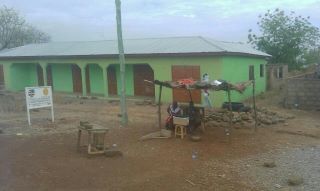Ash Wednesday, Bolgatanga, Ghana

This week, a group of Episcopal Church leaders and lay members are on an Episcopal Relief & Development study tour in Ghana, West Africa, to visit the agency’s field partners and programs. Some of their individual reflections and responses from the trip will be published on the blog. Today, on Ash Wednesday, the Rt. Rev. Wendell N. Gibbs, Jr., Bishop of Michigan, shares some of his thoughts, adapted with permission from the Episcopal Diocese of Michigan.
This is my second trip to the African continent; my first trip to Ghana. I am struck by the amount and severity of poverty that seems to have a stranglehold here. Yesterday, the bishop of the Diocese of Tamale, Bishop Jacob Ayeebo, shared that the census indicates as many as 80% of the people of the diocese live below the poverty level, making this the poorest diocese in Ghana. The opportunities for the church to reach out are plethoric. The partnership between Episcopal Relief & Development and the Anglican Diocesan Development and Relief Organization (ADDRO) is making a difference.
In Ghana, the NetsforLife program has distributed approximately 1.9 million mosquito nets, touching the lives of millions of people. The program is successful because the distribution of nets is accompanied by education and training that encourages the recipients to actually use the nets and seek additional nets when the effectiveness of the net expires after three years. The success of NetsforLife has convinced the government of Ghana to adopt this methodology as a national standard for fighting malaria.
The question I brought with me to Ghana was, “But what else is being done in these communities?” I have not had to wait long to get my answer! The regional staff of ADDRO oversees programs that address 1) food security (teaching sustainable farming practices); 2) needs for micro loans (helping widows and the disabled to be self employed and thus self sustaining); 3) health issues (HIV/AIDS, etc); 4) needs for clean water; 5) education (especially females); 6) issues of child abuse (especially that which occurs if the mother dies in childbirth and the baby is identified as the cause of that death). These are just to name a few!
I am struck by the stunning contrast between life in the United States and life here in Ghana. In the US we take so much for granted; here every drop of clean water, every morsel of food, every smile on the face of a child is so incredibly special. Bishop Jacob said to us yesterday that the Gospel and our response to the Gospel must be concurrent. How we reach out to others is not to be a second thought, but rather an immediate reflection of the Good News of God. May it be so!
Photo: Along the road from Tamale to Bolgatanga, in northern Ghana. Courtesy of Bishop Wendell N. Gibbs, Jr.


